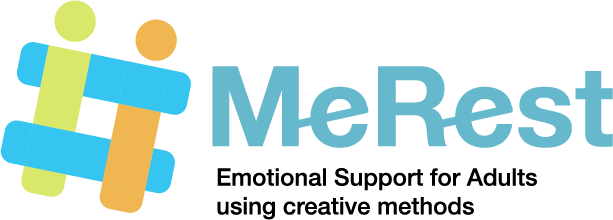Effects of the Covid-19 pandemic: #MeRest project explores the resilience of vulnerable groups through creative expression
The COVID-19 pandemic disrupted the normal existence of a large part of the world’s population, requiring a considerable effort to cope with the new reality imposed by the emergency. People experienced an extremely stressful and new life situation, which affected each individual differently and undoubtedly brought with it medium- and long-term psychological consequences (Holmes et al., 2020). Just as everyone experienced the pandemic and its effects differently, the way they respond to challenges and difficulties differed widely.
Given the fundamental role of resilience in sustaining mental health, the #MeRest project, launched on January 2023, aims to explore and strengthen resilience for social inclusion to marginalised groups that have been particularly affected by the COVID-19 pandemic: older people or people with disabilities, people with mental health issues and health care professionals.
Creative workshops to strength resilience
During the first months of the #MeRest project have been designed and implemented two kinds of workshops addressed to the target groups of the project and based on different creative techniques. Both the workshops are aimed to develop resilience-related skills.
The first one is a narrative based workshop My Resilience Story, where participants are prompted to elicit reflective stories about moments of daily experience which have challenged them deeply in the time of COVID-19 and how they have responded to these challenges in a resilient way. The objectives of the workshop proposal are mainly are to become aware of own experience which have challenged them in the time of COVID-19 with the aim of elaborate own experience and identify the skills they were able to put in practice to adjust to the difficulties they were encountering.
The second one is a visual-art based intervention Expressing My Resilience which can help on developing a range of core components of resilience, on talking about their own resilience individually or in a group and ultimately on using arts activities to foster social empowerment and communicate the lived experience of participants to wider communities. The aims are to increase confidence, sense of identity, self-awareness and self-esteem, to strength adult resilience to life’s challenges and to cooperate and share experiences.
The Transnational Partner Meeting in Athens
On September 14th and 15th 2023 project partnership met in Athens and it was an important opportunity to get to know each other better, analyse the results achieved and plan future project activities. During the meeting, the activities currently underway and the outcomes from national pilots were shared. Future activities for the next project results will concern: podcasts to share the resilience stories of the target groups, a handbook with guidelines and recommendations for replication, and the staff training event that will take place in Italy.
Thanks again to EDRA for the warm welcome in Athens and for organizing the meeting.
Next Steps
In the near future, the results of the various national pilots will be collected and analysed, and #MeRest workshops guidelines for replication and results will be shared.
It will then be possible to learn more about the experiences of older people or people with disabilities, people with mental health issues and health care professionals from Lithuania, Greece, Italy and Romania, as well as resilience capacities that have emerged, in order to improve the resilience skills of various people in different European context.
Do you want to know more?
To learn more about the project please visit our website www.merestproject.eu or follow us on the most popular social networks with #merest_project and #resilience
References:
Holmes E. A., O’Connor R. C., Perry V. H., Tracey I., Wessely S., Arseneault L., et al. (2020). Multidisciplinary research priorities for the COVID-19 pandemic: a call for action for mental health science. Lancet Psychiatry 7 547–560. doi: 10.1016/S2215-0366(20)30168-1
This newsletter is available in:


